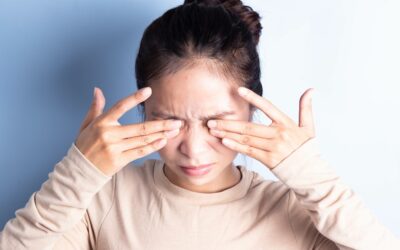Watery eyes, itching, redness—if you’re dealing with these issues, you may be wondering if you have allergies, dry eye, or a little bit of both. Understanding the symptoms and causes of these two conditions can help you figure out what’s behind your discomfort. Let’s explore their differences to find out whether it’s time for antihistamines or eye drops!
Understanding allergies
An allergic reaction occurs when your body overreacts to a harmless substance, such as pollen or pet dander. Depending on the type of allergy—seasonal or environmental—your symptoms can vary. Common allergic responses include sneezing, congestion, watery and itchy eyes, and skin rashes.
Understanding dry eye
Dry eye happens when your eyes don’t produce enough tears, or your tears are of poor quality. Its symptoms can often be confused with allergies, but it has different underlying causes. Risk factors for dry eye include aging, hormonal changes, spending too much time staring at screens, certain medications, and medical conditions such as rheumatoid arthritis, Sjögren’s syndrome, and thyroid disease. If you notice a gritty sensation in your eyes, watery eyes (yes, you read that right), and blurred vision, these could be signs of dry eye syndrome.
Differences between dry eye and allergies
One main distinction between dry eye and allergies is the nature of the symptoms. With dry eye, you may experience overall irritation and a general discomfort in your eyes. However, allergies are more likely to trigger specific, acute episodes after exposure to an allergen.
You can also determine the cause of your symptoms based on the timing and seasonality. Allergies tend to come and go depending on the season or your surroundings. However, dry eye symptoms can persist regardless of the season or location.
Comparing symptoms
If you’re experiencing intense itching along with a runny nose and sneezing, allergies could be the culprit. On the other hand, if you’re dealing with a wider range of symptoms, including a scratchy or stinging sensation and a feeling like something’s in your eye, it could be dry eye.
Both conditions can cause vision issues, but in slightly different ways. Allergies may cause puffiness, while dry eye often causes intermittent blurry vision that improves with blinking.
Seeking professional help
Self-diagnosis can be tricky. These conditions can often mimic one another, and you may suffer from a combination of the two. That’s why it’s essential to visit an optometrist to get the treatment you need, especially if the symptoms worsen or persist.
Once you have a diagnosis, your eye doctor can recommend the best treatment. For allergies, your doctor may recommend avoiding allergens, medication, or, in some cases, allergy shots. Dry eye is typically managed with lifestyle changes, such as using a humidifier, or eye drops. If your dry eye is more serious, your eye doctor may suggest prescription medications or OptiLight IPL (intense pulsed light) therapy to soften and break up blockages in your tear glands.
If you think you may be suffering from dry eye or allergies, contact Lighthouse Vision to schedule an appointment. During a comprehensive eye exam, our eye doctor will determine what’s causing your discomfort and develop a personalized treatment plan. If dry eye is to blame, we offer dry eye treatment in Milford for our patients near Orange, West Haven, Stratford, Monroe, and New Haven, Connecticut. Schedule your appointment today and get back to feeling like yourself.





